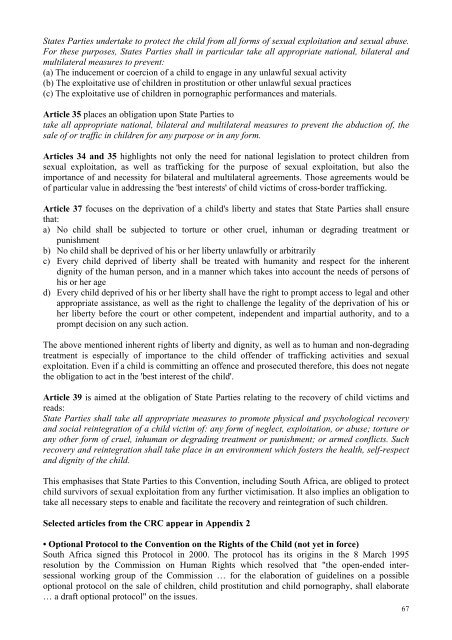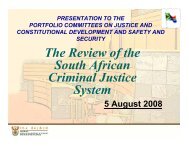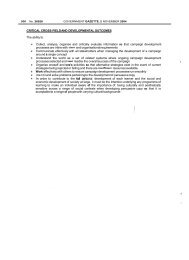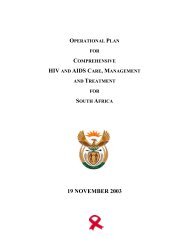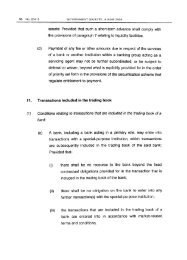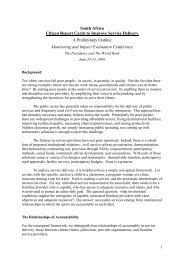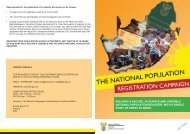The trafficking of children for purposes of sexual exploitation
The trafficking of children for purposes of sexual exploitation
The trafficking of children for purposes of sexual exploitation
Create successful ePaper yourself
Turn your PDF publications into a flip-book with our unique Google optimized e-Paper software.
States Parties undertake to protect the child from all <strong>for</strong>ms <strong>of</strong> <strong>sexual</strong> <strong>exploitation</strong> and <strong>sexual</strong> abuse.<br />
For these <strong>purposes</strong>, States Parties shall in particular take all appropriate national, bilateral and<br />
multilateral measures to prevent:<br />
(a) <strong>The</strong> inducement or coercion <strong>of</strong> a child to engage in any unlawful <strong>sexual</strong> activity<br />
(b) <strong>The</strong> exploitative use <strong>of</strong> <strong>children</strong> in prostitution or other unlawful <strong>sexual</strong> practices<br />
(c) <strong>The</strong> exploitative use <strong>of</strong> <strong>children</strong> in pornographic per<strong>for</strong>mances and materials.<br />
Article 35 places an obligation upon State Parties to<br />
take all appropriate national, bilateral and multilateral measures to prevent the abduction <strong>of</strong>, the<br />
sale <strong>of</strong> or traffic in <strong>children</strong> <strong>for</strong> any purpose or in any <strong>for</strong>m.<br />
Articles 34 and 35 highlights not only the need <strong>for</strong> national legislation to protect <strong>children</strong> from<br />
<strong>sexual</strong> <strong>exploitation</strong>, as well as <strong>trafficking</strong> <strong>for</strong> the purpose <strong>of</strong> <strong>sexual</strong> <strong>exploitation</strong>, but also the<br />
importance <strong>of</strong> and necessity <strong>for</strong> bilateral and multilateral agreements. Those agreements would be<br />
<strong>of</strong> particular value in addressing the 'best interests' <strong>of</strong> child victims <strong>of</strong> cross-border <strong>trafficking</strong>.<br />
Article 37 focuses on the deprivation <strong>of</strong> a child's liberty and states that State Parties shall ensure<br />
that:<br />
a) No child shall be subjected to torture or other cruel, inhuman or degrading treatment or<br />
punishment<br />
b) No child shall be deprived <strong>of</strong> his or her liberty unlawfully or arbitrarily<br />
c) Every child deprived <strong>of</strong> liberty shall be treated with humanity and respect <strong>for</strong> the inherent<br />
dignity <strong>of</strong> the human person, and in a manner which takes into account the needs <strong>of</strong> persons <strong>of</strong><br />
his or her age<br />
d) Every child deprived <strong>of</strong> his or her liberty shall have the right to prompt access to legal and other<br />
appropriate assistance, as well as the right to challenge the legality <strong>of</strong> the deprivation <strong>of</strong> his or<br />
her liberty be<strong>for</strong>e the court or other competent, independent and impartial authority, and to a<br />
prompt decision on any such action.<br />
<strong>The</strong> above mentioned inherent rights <strong>of</strong> liberty and dignity, as well as to human and non-degrading<br />
treatment is especially <strong>of</strong> importance to the child <strong>of</strong>fender <strong>of</strong> <strong>trafficking</strong> activities and <strong>sexual</strong><br />
<strong>exploitation</strong>. Even if a child is committing an <strong>of</strong>fence and prosecuted there<strong>for</strong>e, this does not negate<br />
the obligation to act in the 'best interest <strong>of</strong> the child'.<br />
Article 39 is aimed at the obligation <strong>of</strong> State Parties relating to the recovery <strong>of</strong> child victims and<br />
reads:<br />
State Parties shall take all appropriate measures to promote physical and psychological recovery<br />
and social reintegration <strong>of</strong> a child victim <strong>of</strong>: any <strong>for</strong>m <strong>of</strong> neglect, <strong>exploitation</strong>, or abuse; torture or<br />
any other <strong>for</strong>m <strong>of</strong> cruel, inhuman or degrading treatment or punishment; or armed conflicts. Such<br />
recovery and reintegration shall take place in an environment which fosters the health, self-respect<br />
and dignity <strong>of</strong> the child.<br />
This emphasises that State Parties to this Convention, including South Africa, are obliged to protect<br />
child survivors <strong>of</strong> <strong>sexual</strong> <strong>exploitation</strong> from any further victimisation. It also implies an obligation to<br />
take all necessary steps to enable and facilitate the recovery and reintegration <strong>of</strong> such <strong>children</strong>.<br />
Selected articles from the CRC appear in Appendix 2<br />
• Optional Protocol to the Convention on the Rights <strong>of</strong> the Child (not yet in <strong>for</strong>ce)<br />
South Africa signed this Protocol in 2000. <strong>The</strong> protocol has its origins in the 8 March 1995<br />
resolution by the Commission on Human Rights which resolved that "the open-ended intersessional<br />
working group <strong>of</strong> the Commission … <strong>for</strong> the elaboration <strong>of</strong> guidelines on a possible<br />
optional protocol on the sale <strong>of</strong> <strong>children</strong>, child prostitution and child pornography, shall elaborate<br />
… a draft optional protocol" on the issues.<br />
67


